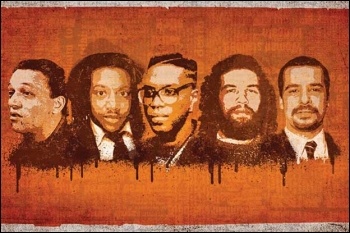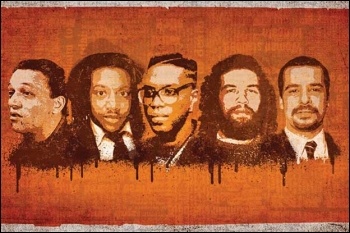Another miscarriage of justice exposing police racism
John Williams, Cardiff West Socialist Party
‘A Killing in Tiger Bay’ is an in-depth, three-part documentary telling the story of one of the biggest miscarriages of justice in British criminal history – ‘the Cardiff Three’. These three men were falsely convicted of murder, although initially five men were charged, with two also spending time in jail.
Lynette White was a Grangetown resident who was brutally murdered in the multi-ethnic working-class area of Butetown on Valentine’s Day in 1988.
Immediately after Lynette’s murder the police issued a description of a suspect – a white man seen outside the scene. But shortly after, despite no incriminating evidence, five black or mixed-race men were tried: her boyfriend Stephen Miller, and Tony Paris, Yusef Abdullahi, along with John and Ronnie Actie. Miller, Paris and Abdullahi were found guilty; while the true culprit, eventually convicted, remained at large.
This was a case of police corruption and institutional racism. The documentary exposes the bigoted views in the police, who claimed the community held “illegal drinking dens” and were “lazy”.
It also attempts to tell viewers what some working-class people really think about the police. Butetown residents said that it wouldn’t be unusual for police to beat up black boys, and then charge them with assault.
One of the people interviewed describes how South Wales Police were a law unto themselves, “like the Wild West”, and were well-known for taking bribes and paying false witnesses. This is a pretty damning and honest admission from someone who, in the documentary, disgracefully attempts to justify the actions of the police.
The documentary doesn’t shy away or sugar-coat the awful actions of the police. It shows videotapes of the men, who obviously faced mental torture, abuse and manipulation, being interviewed by police. The senior officer in one interview even said: “I’ll keep putting things in your head”.
It also sheds lights on working-class struggles that were taking place – the so-called ‘race riots’ of the 1980s, which exposed the institutional racism in the police. This never went away, no matter what the police and establishment have said.
Although the documentary doesn’t put forward any demands that the Socialist Party would, such as democratic control of the police, or draw the conclusion that it is ‘divide and rule’ from people at the top of society that drives racism, it does clearly show that racism and discrimination is institutionalised. Nonetheless, a mass united struggle of working-class people can force concessions, as the Cardiff Three campaign did by eventually overturning the convictions.








